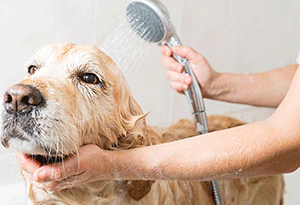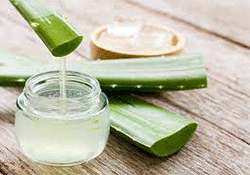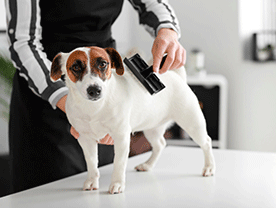Dogs often suffer from itchy skin, which can be caused by allergies, parasites, or dry skin. While it’s essential to consult a veterinarian for persistent issues, there are several home remedies you can try to alleviate your dog's discomfort. Here’s how to treat dog itchy skin at home.
Other Topics You Might Like
Helpful Products You Might Like

Product Name

Product Name

Product Name
"(Paid Links)" 
Oatmeal Bath
Oatmeal is known for its soothing properties and can provide relief for itchy skin. Grind plain, unflavored oatmeal into a fine powder and mix it with warm water to create a thick paste. Apply the paste to your dog's skin, leave it on for 10-15 minutes, then rinse thoroughly.

Apple Cider Vinegar Spray
Apple cider vinegar has anti-inflammatory and antibacterial properties that can help soothe itchy skin. Mix equal parts of apple cider vinegar and water in a spray bottle. Spray the solution onto your dog’s skin, avoiding open wounds or sore areas. Let it air dry.
Coconut Oil
Coconut oil is an excellent moisturizer and can help reduce itching caused by dry skin. Gently massage a small amount of coconut oil into your dog's skin, focusing on the affected areas. Coconut oil also has antibacterial and antifungal properties that can promote healing.
Aloe Vera Gel

Aloe vera gel is soothing and can help reduce inflammation and itchiness. Use pure aloe vera gel (without additives) and apply it directly to your dog's itchy spots. Be cautious, as some dogs may be allergic to aloe vera; test a small area first.
Chamomile or Green Tea Rinse
Chamomile and green tea have anti-inflammatory and soothing properties. Brew a strong tea, let it cool, and use it as a rinse for your dog’s skin. Pour the tea over the affected areas, let it sit for a few minutes, then rinse with cool water
Baking Soda Paste
Baking soda can help neutralize itching and reduce inflammation. Mix baking soda with water to form a paste and apply it to the itchy areas. Leave it on for about 10-15 minutes, then rinse off with water. Avoid using this on open sores or wounds.
Omega-3 Fatty Acid Supplements
Omega-3 fatty acids can improve skin health and reduce inflammation. Adding fish oil or flaxseed oil to your dog's diet can help alleviate itching and promote a healthy coat. Consult your veterinarian for the appropriate dosage.
Regular Brushing
Regular brushing can help remove allergens, dead skin, and loose fur, reducing the chances of itching. Use a brush suitable for your dog's coat type and brush gently to avoid irritating the skin further.

Hydrocortisone Cream
Over-the-counter hydrocortisone cream can provide temporary relief from itching. Apply a small amount to the affected areas, ensuring your dog does not lick it off. Avoid long-term use and consult your veterinarian if the itching persists.
Proper Diet and Hydration
Ensure your dog is on a balanced diet and stays well-hydrated. Allergies to certain foods can cause skin issues, so consider a hypoallergenic diet if your dog has persistent skin problems. Providing plenty of fresh water helps keep the skin hydrated.
Avoiding Allergens
Identify and avoid potential allergens that may be causing your dog's itching. Common allergens include pollen, dust mites, certain foods, and chemicals in grooming products. Keeping your home clean and using hypoallergenic products can help.
Consult a Veterinarian
If home remedies do not provide relief or if your dog’s condition worsens, consult a veterinarian. Persistent itching may indicate an underlying health issue that requires professional treatment.
By following these home remedies, you can help soothe your dog's itchy skin and improve their comfort. Always monitor your dog's response to treatments and consult a veterinarian for persistent or severe issues.
